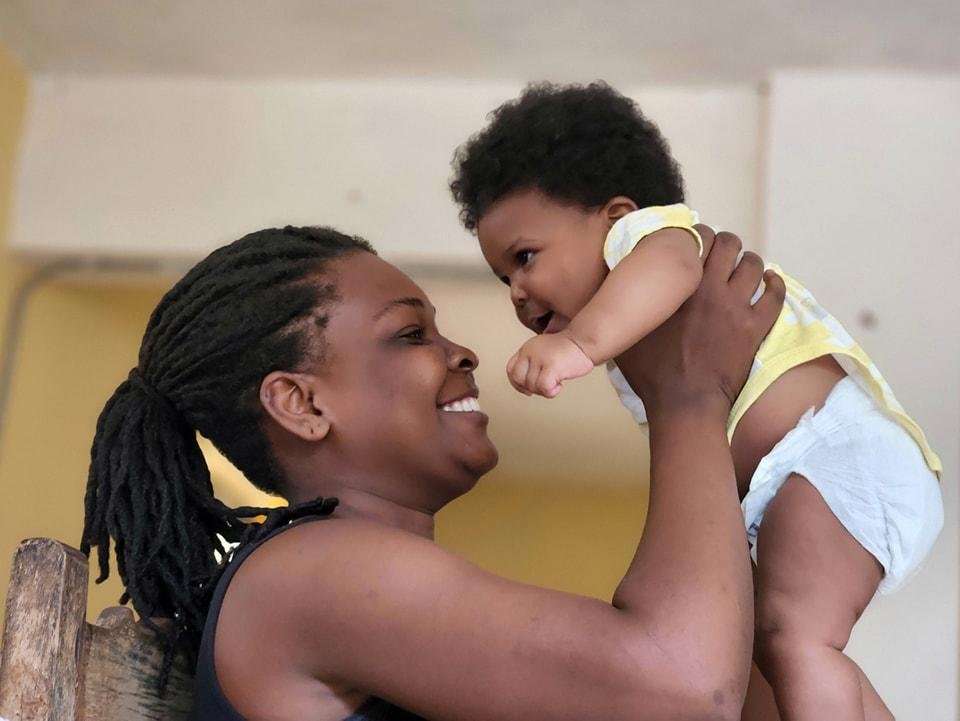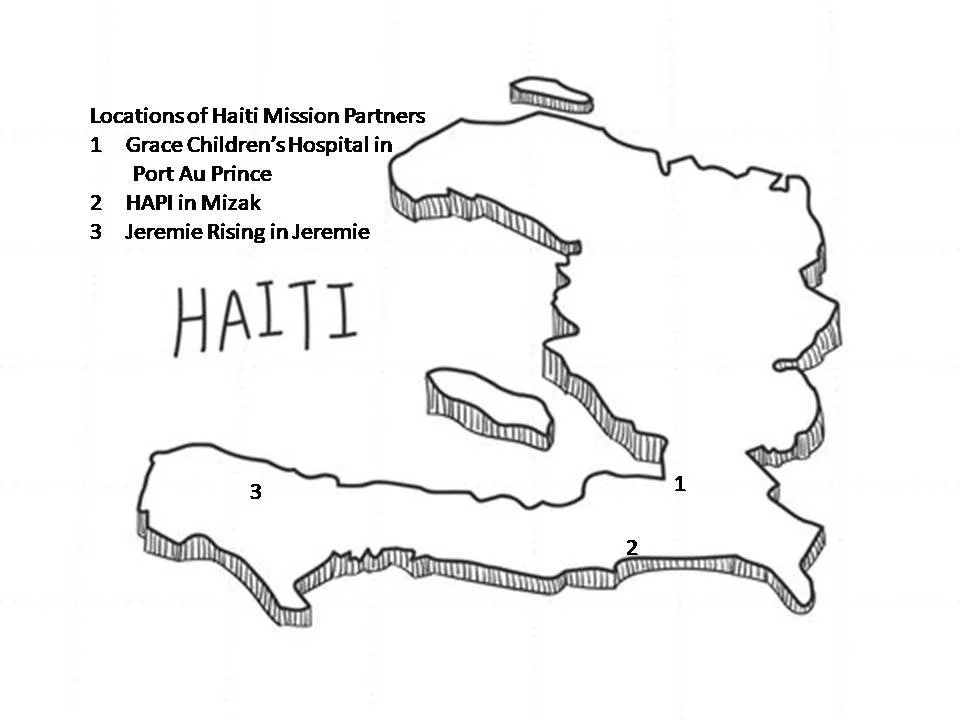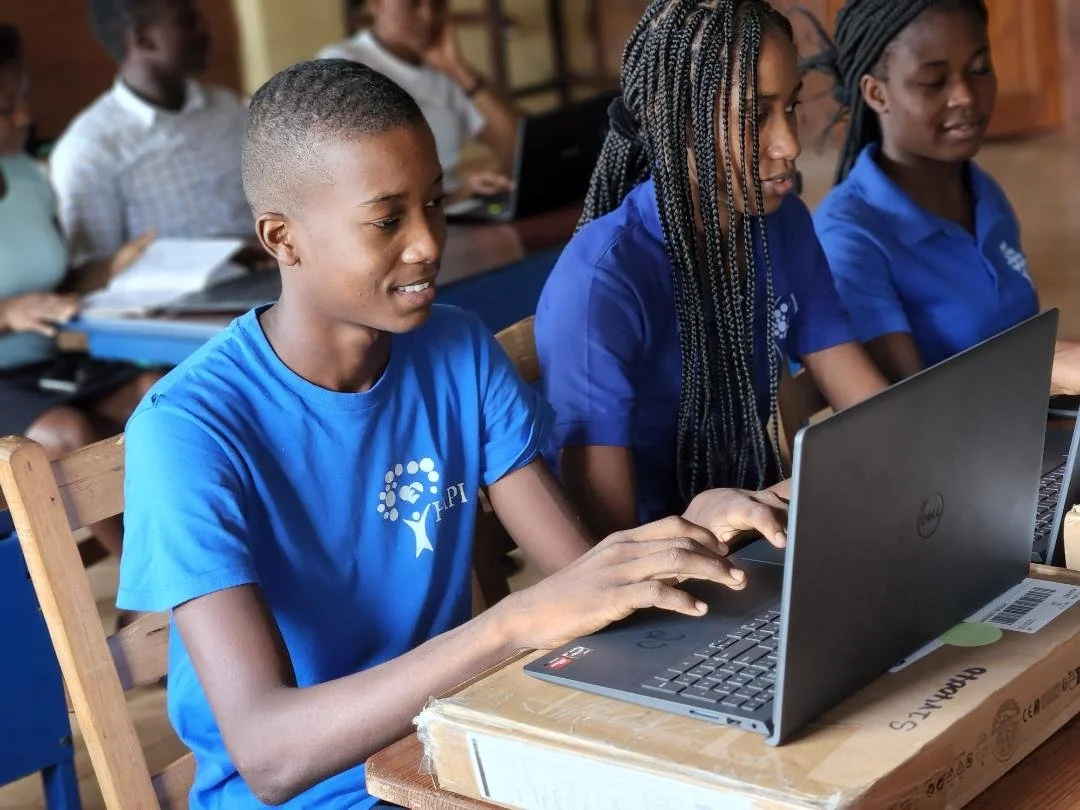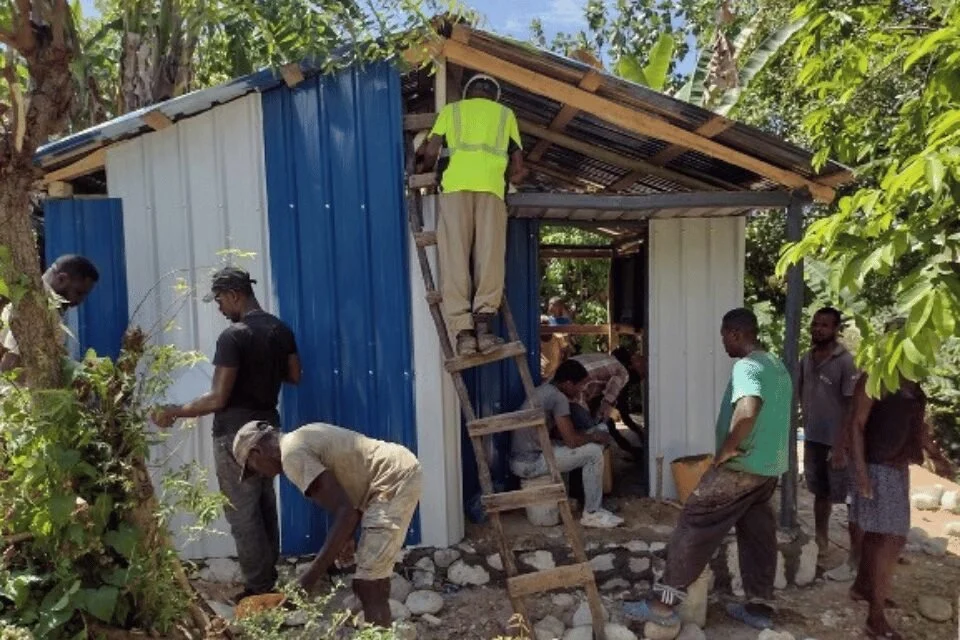Michigan UMs plant seeds of hope Posted on November 4, 2025
A Mizak, Haiti, mom cherishes her child. Both benefit from care received through the Start Right program offered by HAPI (Haitian Assets for Peace International). ~ photo courtesy Valerie Mossman-Celestin.
Get your local church on board and join the Gardens of Hope campaign in support of our mission partners in Haiti.
GLENN M. WAGNER
Michigan Conference Communications
A priority of Jesus is ministry with the poor.
In his parable of the last judgment, Jesus made this point of eternal consequence: “Just as you did it to one of the least of these brothers and sisters of mine, you did it to me” (Matthew 25:40, NRSVUE).
In the early days of the Christian movement, the Apostle Paul also recalled how this priority was reinforced by disciples who endorsed Paul’s plans for extending Jesus’ mission beyond Jerusalem to the Gentiles.
At the Jerusalem Conference around AD 50, Paul was given permission to take the message of Jesus into the wider world along with the exhortation “that we remember the poor” (Galatians 2:10, NRSVUE). Paul was eager to keep this priority.
Even before Jesus and Paul, a psalmist in the Bible expressed a similar conviction: “Defend the weak and the fatherless; uphold the cause of the poor and the oppressed” (Psalm 82:3, NIV).
Former President Jimmy Carter echoed God’s concern for the poor this way: “The measure of a society is found in how they treat their weakest and most helpless citizens.”
For many North American followers of Jesus, remembering the poor after the example of Jesus has included continuing care for the people of Haiti. This island nation, located in the Caribbean Sea approximately 700 miles south of Miami, has a population of 11.9 million. Haitians are 95% Christian and live in the poorest nation in the Western Hemisphere. Haiti’s per capita annual income is around $3,000. Poverty there also impacts crime, government corruption, lowered life expectancy, and reduced educational achievement. Fewer than 5% of Haitian children graduate from high school. In Michigan, 82.8% of children graduate high school.
Geographic locations for the mission partners in Haiti. ~ map courtesy Gardens of Hope
Michigan United Methodists, in partnership with the leadership of the Michigan Conference Haiti Task Force, have established vital partnerships with Haitians in ministries that change lives, build community, share the love of Christ, and foster hope.
The 2025 Michigan Annual Conference overwhelmingly endorsed supporting the Gardens of Hope campaign, with a goal of raising $200,000, to support life-changing ministries in Haiti that plant seeds of hope for a better future. If each United Methodist congregation gives $350, the campaign will meet its goal. Explore resources for promoting this campaign and how to give.
The campaign aims to raise a total of $100,000 — $33,333 for each of the first three partners — to support well-established ministries in Haiti:
Grace Children’s Hospital in Port-au-Prince, Haiti’s capital city
Haitian Assets for Peace International (HAPI) in Mizak, Haiti
Jeremie Rising in Jérémie, Haiti
The Gardens of Hope campaign will also raise $100,000 to seed a new venture in Haiti called MUSO (Mutual Solidarity). Its parent organization, Grassroots Community Voices Foundation, plans to launch, through MUSO, new mutual solidarity groups in Mizak and Jeremie.
Grace Children’s Hospital
This vital medical center is located in Port-au-Prince. The greater metropolitan area of Haiti’s capital city is home to more than three million people. Extreme poverty and gang violence challenge critical health care services across the city. Grace Children’s Hospital continues to provide vital inpatient, outpatient, and mobile medical services to children and their families.
Grace Children’s Hospital in Port-au-Prince, Haiti, offers essential medical care to children and their families. ~ photo courtesy Grace Children’s Hospital
Fees for all of Grace Children’s Hospital’s services are determined by a sliding scale based on the patient’s income. No one is ever turned away because of their inability to pay. Grace Children’s Hospital will utilize funds from the Gardens of Hope campaign to purchase necessary medical equipment and supplies, furthering its critical mission of providing care for Haitian children and their families.
Haitian Assets for Peace International (HAPI)
HAPI will use its share of the Gardens of Hope campaign to help fund health care visits and technical and vocational training for young adults.
HAPI operates in Mizak, a rural, mountainous community with an estimated population of over 20,000 people in the southeast of the country. Valerie Mossman-Celestin, founder and board president, is passionate about the HAPI programs offered by the people of Mizak, which aim to make a transformational difference in their community. These include the following:
HAPI medical staff provide prenatal care as part of their Start Right program. ~ photo courtesy Valerie Mossman-Celestin
The Felisane Health Center provides professional health care, dental care, urgent care, pharmacy, maternal, newborn, and child health care, as well as home medical visits for persons with disabilities in the Mizak area.
The Start Right program addresses a critical need to improve maternal, newborn, and child health in an area where infant mortality is eight times greater in Haiti than in the United States, and death under the age of five is ten times greater in Haiti.
Students at HAPITech in Mizak learn computer skills. ~ photo Courtesy Valerie Mossman-Celestin
HAPITech is Mizak’s first technical school, offering critical technical job skills education to young adults. Some 65% of Mizak’s population is under the age of twenty-five. Current training includes teaching English as a second language and computer literacy, with plans to add instruction in the profitable and in-demand vocational skill of ceramic tiling, with funding from the Gardens of Hope campaign.
Jeremie Rising
Michigan United Methodists founded this nonprofit in response to the devastating earthquake in Haiti in 2010. John Smith, a retired engineer from General Motors, and his wife, Nancy Smith, an intensive care nurse with trauma training, joined a team of volunteers that traveled to Haiti to assist with medical care and earthquake recovery. That mission effort sparked a passion and grew relationships with Haitians in the city of Jérémie, which continue to make a life-changing difference for residents and for the partnering organizations and congregations. Jérémie is a city with a population of about 137,000 located on the southwestern peninsula of Haiti, about a six-hour drive from Port-au-Prince.
Students in the Jeremie Rising K-12 school program show off their backpacks and supplies. ~ photo courtesy John Smith
The Smiths helped launch Jeremie Rising with the assistance of Birmingham: First United Methodist Church, which sponsored annual mission trips and secured support from many other Michigan United Methodist congregations. Establishing a separate nonprofit organization enables this program to also partner with willing secular groups that are otherwise unable to give funds through a church. Even though the Smiths have now retired to Utah to be closer to their children, they continue to provide leadership for the ministry, working with friends in Haiti and Michigan.
With the Gardens of Hope funds, Jeremie Rising plans to pay for five mobile health clinics and K-12 education for 74 additional students in a school that already sponsors 220 students. The annual tuition cost per student is $400.
Jeremie Rising crew works to build a shelter home for a family experiencing homelessness. ~ photo courtesy John Smith
John Smith is grateful for trusted partners in church and in business who continue to help Jeremie Rising equip Haitians for fruitful living. He credits Agape Flights, a mission transportation ministry out of Venice, Florida, with providing valuable assistance in transporting needed supplies by air from the United States directly to Jérémie. Smith is also grateful for the valuable financial and technical assistance provided to this ministry by the McGuinn Homes Foundation, which helped finance the rebuilding of a needed orphanage in Jeremie.
Valerie Mossman-Celestin, co-chair of the Michigan Conference’s Haiti Task Force, is thankful for what this campaign can do: “Your support for the Gardens of Hope Campaign can equip these partners to keep going, to go further, and to create lasting change.”
Half of the Gardens of Hope campaign dollars — $100,000 — will support the efforts of MUSO (Mutual Solidarity).
MUSO is a strategy born in Africa that is now being developed by Haitians for Haitians. Its parent organization, Grassroots Community Voices Foundation, works in health, sanitation, disaster recovery, and economic development. Josué Andrè is the chairman of the foundation’s board of directors. He was born in Jacmel in southern Haiti.
Mutual Solidarity Group meets in Haiti. ~ photo courtesy Josuè Andrè
Josuè Andrè grew up in Haiti in a pastoral family. He followed in his father’s footsteps and pastors five nondenominational churches in the mountains of Haiti.
Josuè earned his master’s degree at the Sorbonne University in France and has a doctoral degree in international entrepreneurship. Josuè has worked in finance and community development for the past 15 years. Josuè has partnered with the General Board of Global Ministries / UMCOR, UNICEF, USAID, Church of the Resurrection (a large United Methodist congregation in Leawood, Kansas), and the Methodist Church of Haiti. He is committed to community development where outside groups partner with local people to improve personal and community life.
Valerie Mossman-Celestin notes, “It is great to work with a Haitian who is leading Haitians.” Gardens of Hope will enable MUSO to start 20 mutual solidarity groups in Haitian cities where there are already established ministries and leadership teams. Ten groups will be started in Mizak and ten in Jeremie. MUSO’s share of the campaign offerings — $100,000 — will be used to pay for training and materials for these groups, which will function like gardens fostering community life and vitality.
Team from Grassroots Community Voices Foundation (MUSO) with cholera kits donated from the General Board of Global Ministries to help improve local health. ~ photo courtesy Josuè Andrè.
According to Josuè, the local solidarity groups already functioning in Haiti require punctuality, faithful attendance, and regular financial contributions to a group account, which then enables low-interest loans for life and business needs, as well as dividends, for members. The groups also teach important life skills, basic sanitation, and help coordinate health care via mobile medical clinics.
Has your church promoted the Gardens of Hope campaign? Are you on your way to contribute the $350 each church has promised to give toward the campaign? Download these helpful fundraising ideas and promotional materials, including flyers and videos, to be used in your local church. A video featuring each of the mission partners has been created for use by local churches.
Last Updated on November 4, 2025
Posted in Featured, NewsTagged Gardens of Hope, Grace Children's Hospital, Haiti Covenant Partners, Haitian Assets for Peace International, Jeremie Rising, MUSO








